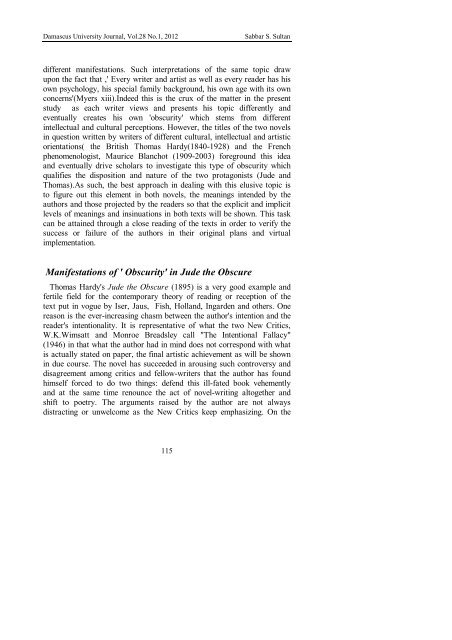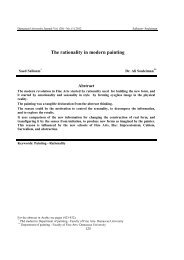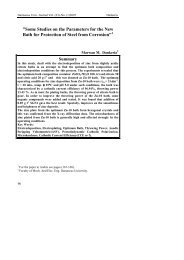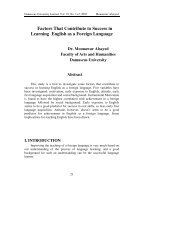Types of Obscurity in Thomas Hardy's Jude the Obscure and ...
Types of Obscurity in Thomas Hardy's Jude the Obscure and ...
Types of Obscurity in Thomas Hardy's Jude the Obscure and ...
Create successful ePaper yourself
Turn your PDF publications into a flip-book with our unique Google optimized e-Paper software.
Damascus University Journal, Vol.28 No.1, 2012Sabbar S. Sult<strong>and</strong>ifferent manifestations. Such <strong>in</strong>terpretations <strong>of</strong> <strong>the</strong> same topic drawupon <strong>the</strong> fact that ,' Every writer <strong>and</strong> artist as well as every reader has hisown psychology, his special family background, his own age with its ownconcerns'(Myers xiii).Indeed this is <strong>the</strong> crux <strong>of</strong> <strong>the</strong> matter <strong>in</strong> <strong>the</strong> presentstudy as each writer views <strong>and</strong> presents his topic differently <strong>and</strong>eventually creates his own 'obscurity' which stems from different<strong>in</strong>tellectual <strong>and</strong> cultural perceptions. However, <strong>the</strong> titles <strong>of</strong> <strong>the</strong> two novels<strong>in</strong> question written by writers <strong>of</strong> different cultural, <strong>in</strong>tellectual <strong>and</strong> artisticorientations( <strong>the</strong> British <strong>Thomas</strong> Hardy(1840-1928) <strong>and</strong> <strong>the</strong> Frenchphenomenologist, Maurice Blanchot (1909-2003) foreground this idea<strong>and</strong> eventually drive scholars to <strong>in</strong>vestigate this type <strong>of</strong> obscurity whichqualifies <strong>the</strong> disposition <strong>and</strong> nature <strong>of</strong> <strong>the</strong> two protagonists (<strong>Jude</strong> <strong>and</strong><strong>Thomas</strong>).As such, <strong>the</strong> best approach <strong>in</strong> deal<strong>in</strong>g with this elusive topic isto figure out this element <strong>in</strong> both novels, <strong>the</strong> mean<strong>in</strong>gs <strong>in</strong>tended by <strong>the</strong>authors <strong>and</strong> those projected by <strong>the</strong> readers so that <strong>the</strong> explicit <strong>and</strong> implicitlevels <strong>of</strong> mean<strong>in</strong>gs <strong>and</strong> <strong>in</strong>s<strong>in</strong>uations <strong>in</strong> both texts will be shown. This taskcan be atta<strong>in</strong>ed through a close read<strong>in</strong>g <strong>of</strong> <strong>the</strong> texts <strong>in</strong> order to verify <strong>the</strong>success or failure <strong>of</strong> <strong>the</strong> authors <strong>in</strong> <strong>the</strong>ir orig<strong>in</strong>al plans <strong>and</strong> virtualimplementation.Manifestations <strong>of</strong> ' <strong>Obscurity</strong>' <strong>in</strong> <strong>Jude</strong> <strong>the</strong> <strong>Obscure</strong><strong>Thomas</strong> <strong>Hardy's</strong> <strong>Jude</strong> <strong>the</strong> <strong>Obscure</strong> (1895) is a very good example <strong>and</strong>fertile field for <strong>the</strong> contemporary <strong>the</strong>ory <strong>of</strong> read<strong>in</strong>g or reception <strong>of</strong> <strong>the</strong>text put <strong>in</strong> vogue by Iser, Jaus, Fish, Holl<strong>and</strong>, Ingarden <strong>and</strong> o<strong>the</strong>rs. Onereason is <strong>the</strong> ever-<strong>in</strong>creas<strong>in</strong>g chasm between <strong>the</strong> author's <strong>in</strong>tention <strong>and</strong> <strong>the</strong>reader's <strong>in</strong>tentionality. It is representative <strong>of</strong> what <strong>the</strong> two New Critics,W.K.Wimsatt <strong>and</strong> Monroe Breadsley call "The Intentional Fallacy"(1946) <strong>in</strong> that what <strong>the</strong> author had <strong>in</strong> m<strong>in</strong>d does not correspond with whatis actually stated on paper, <strong>the</strong> f<strong>in</strong>al artistic achievement as will be shown<strong>in</strong> due course. The novel has succeeded <strong>in</strong> arous<strong>in</strong>g such controversy <strong>and</strong>disagreement among critics <strong>and</strong> fellow-writers that <strong>the</strong> author has foundhimself forced to do two th<strong>in</strong>gs: defend this ill-fated book vehemently<strong>and</strong> at <strong>the</strong> same time renounce <strong>the</strong> act <strong>of</strong> novel-writ<strong>in</strong>g altoge<strong>the</strong>r <strong>and</strong>shift to poetry. The arguments raised by <strong>the</strong> author are not alwaysdistract<strong>in</strong>g or unwelcome as <strong>the</strong> New Critics keep emphasiz<strong>in</strong>g. On <strong>the</strong>115
















